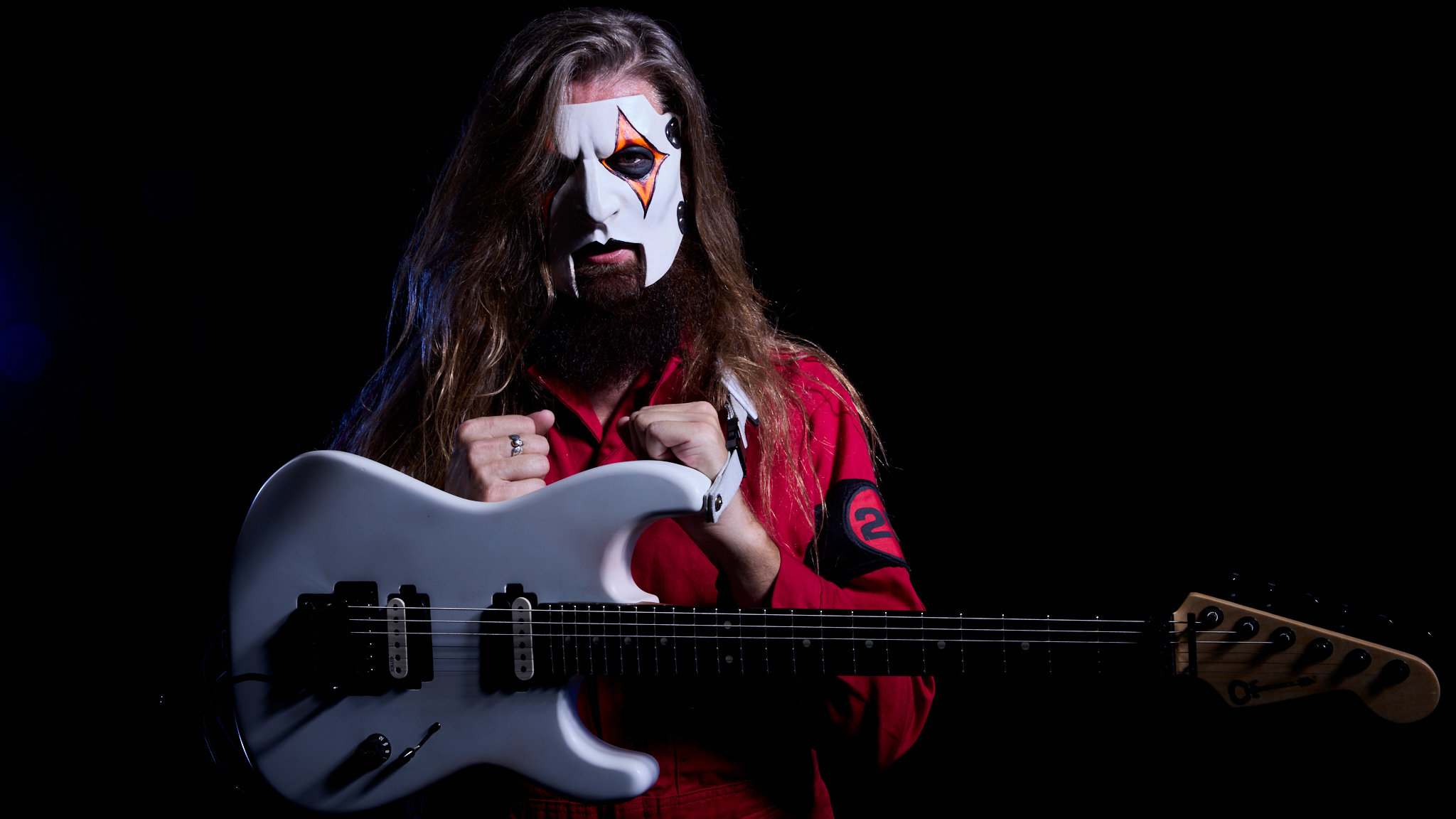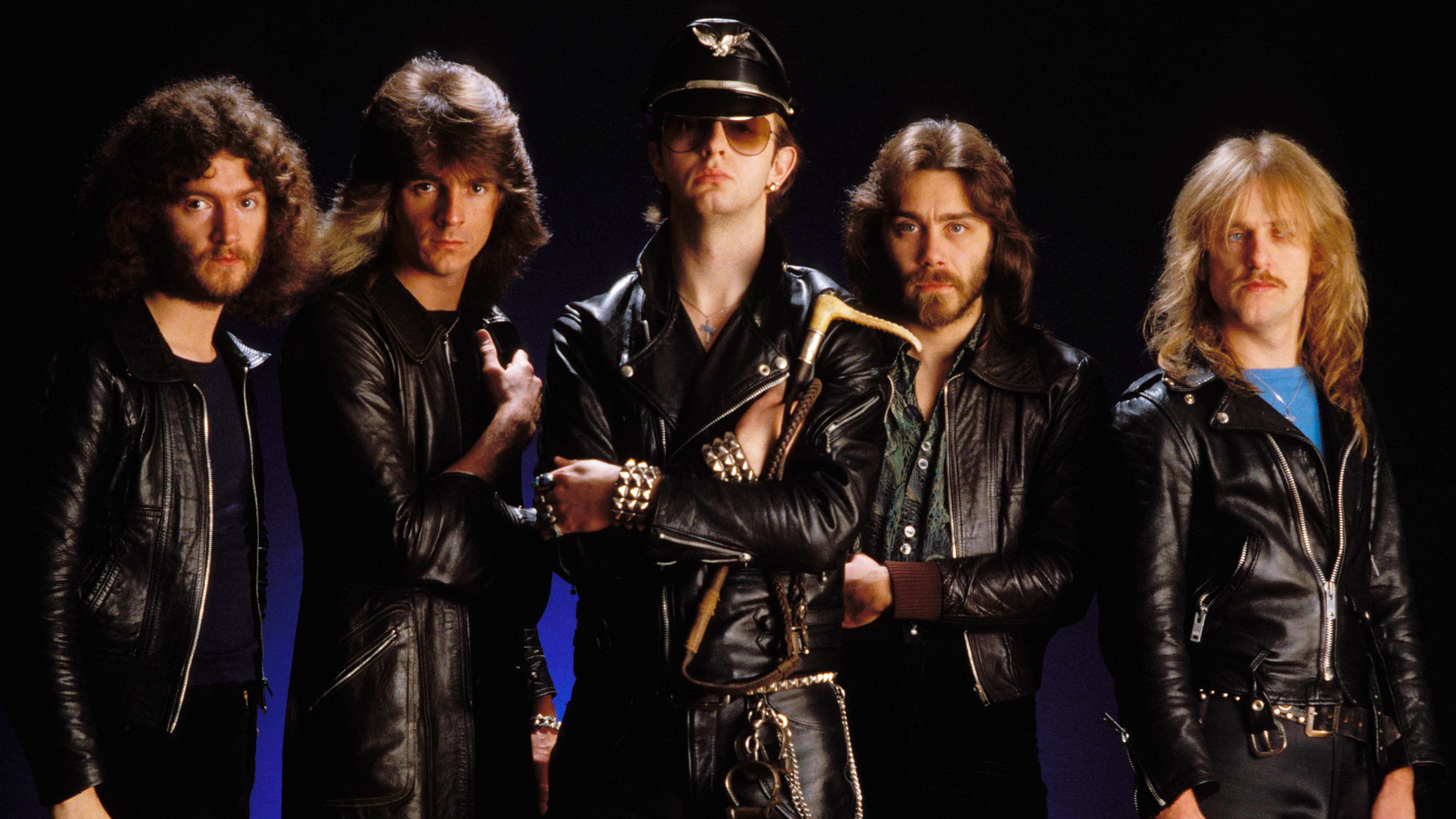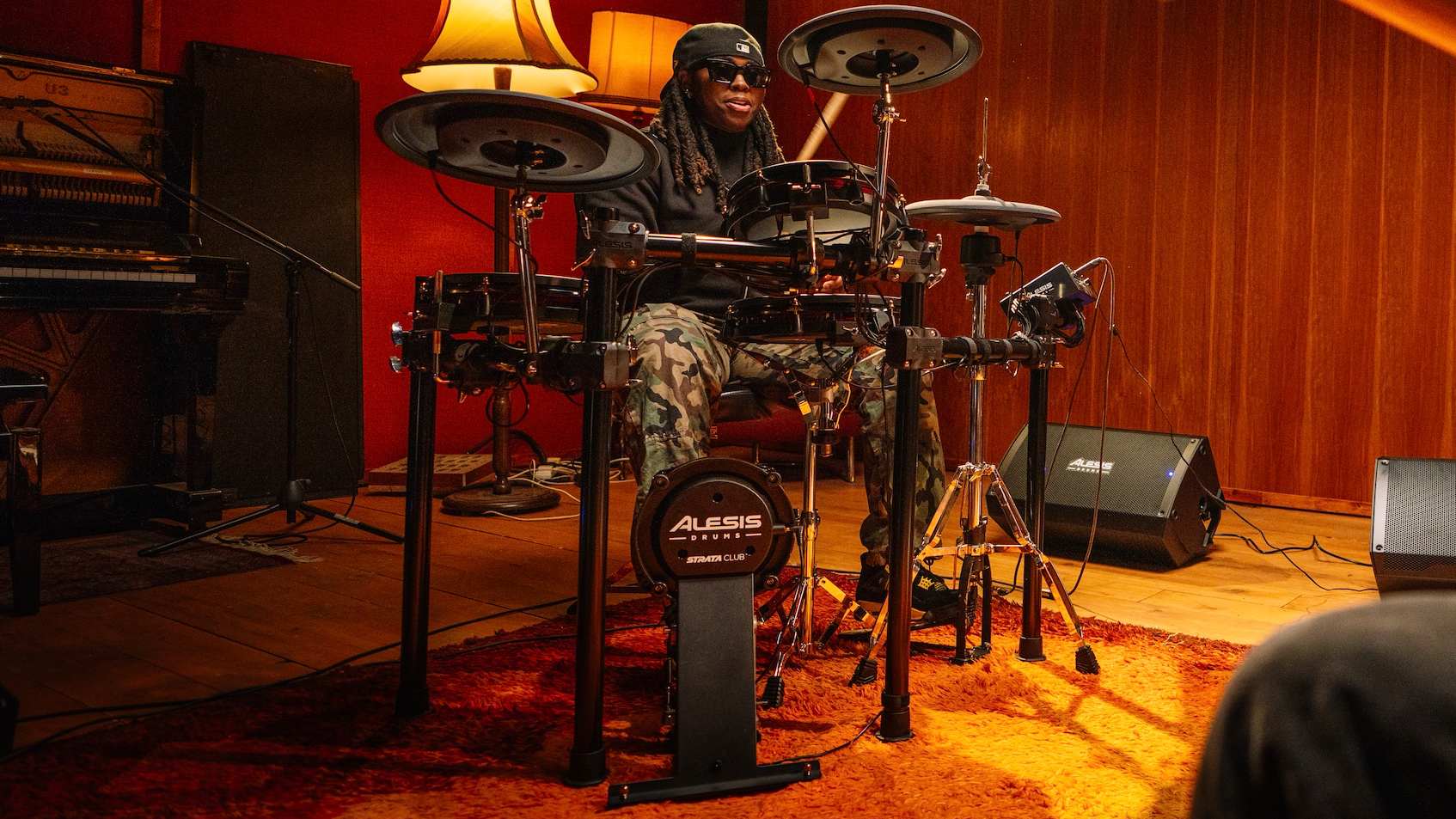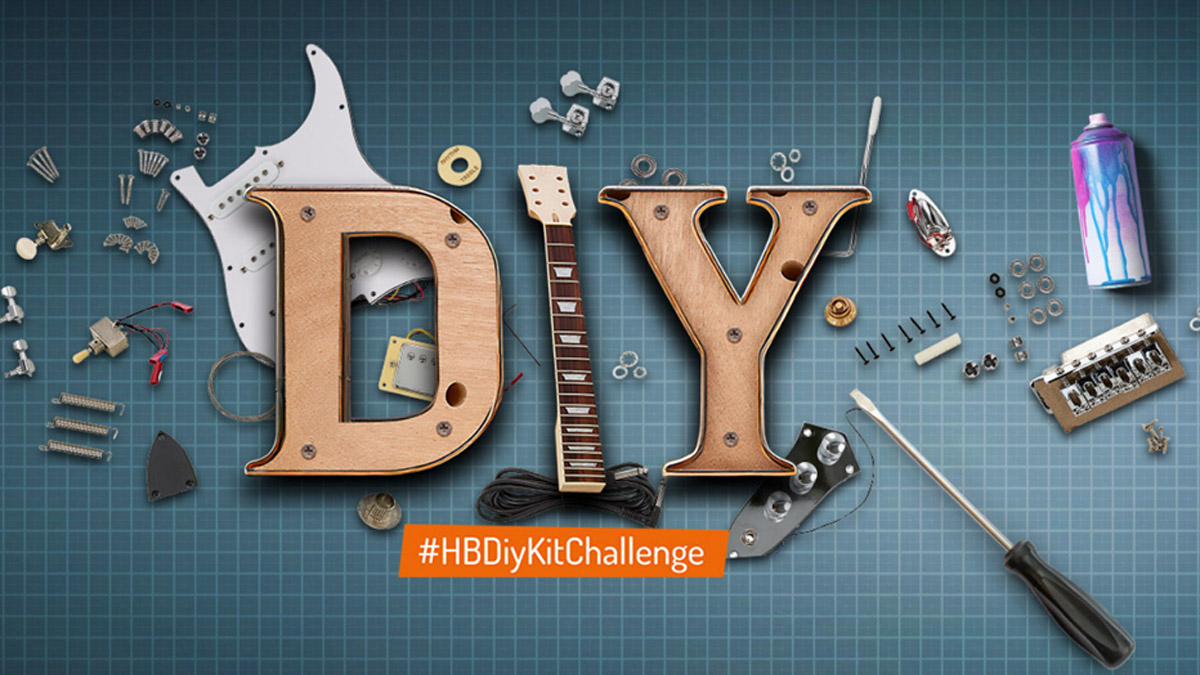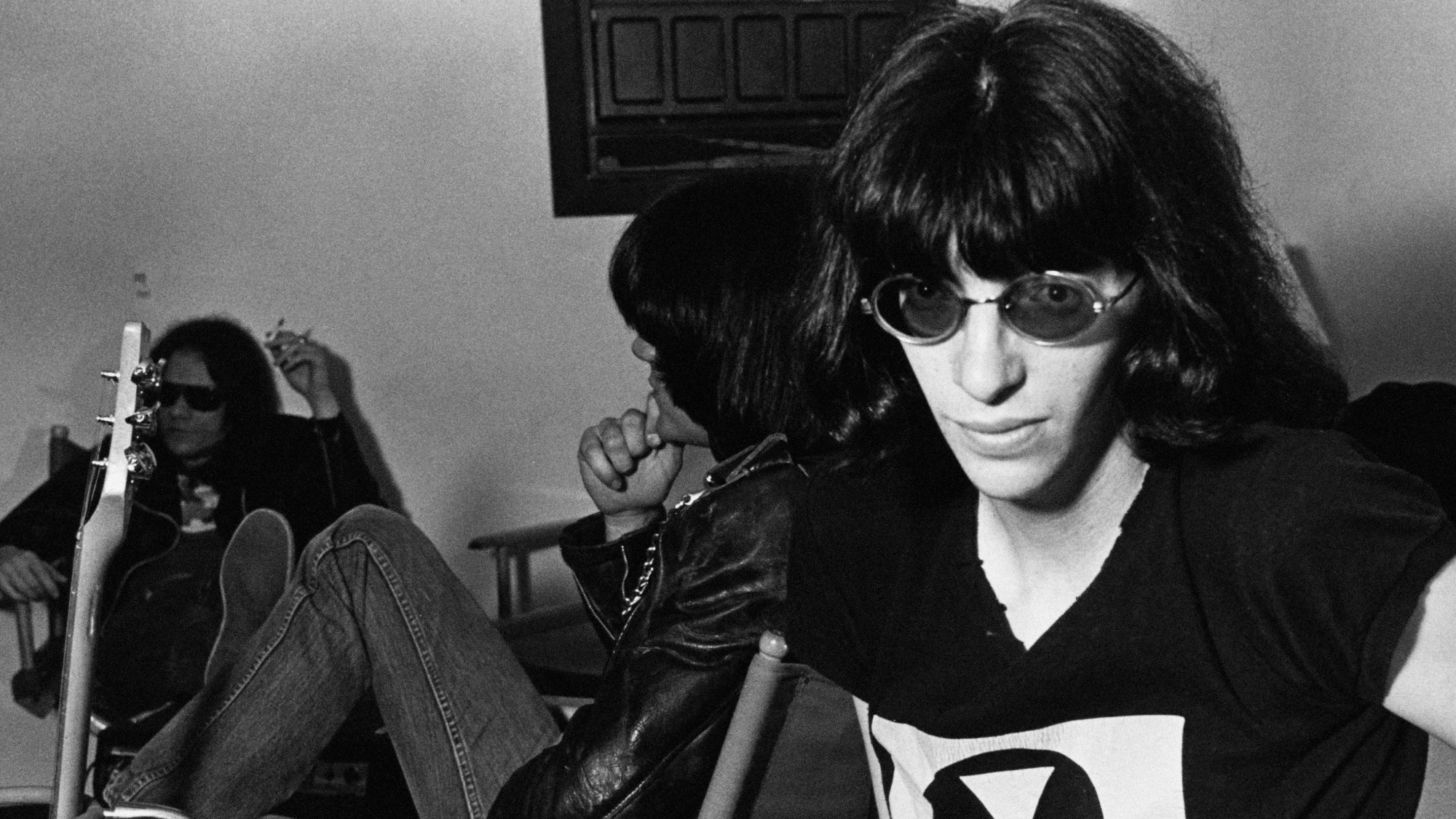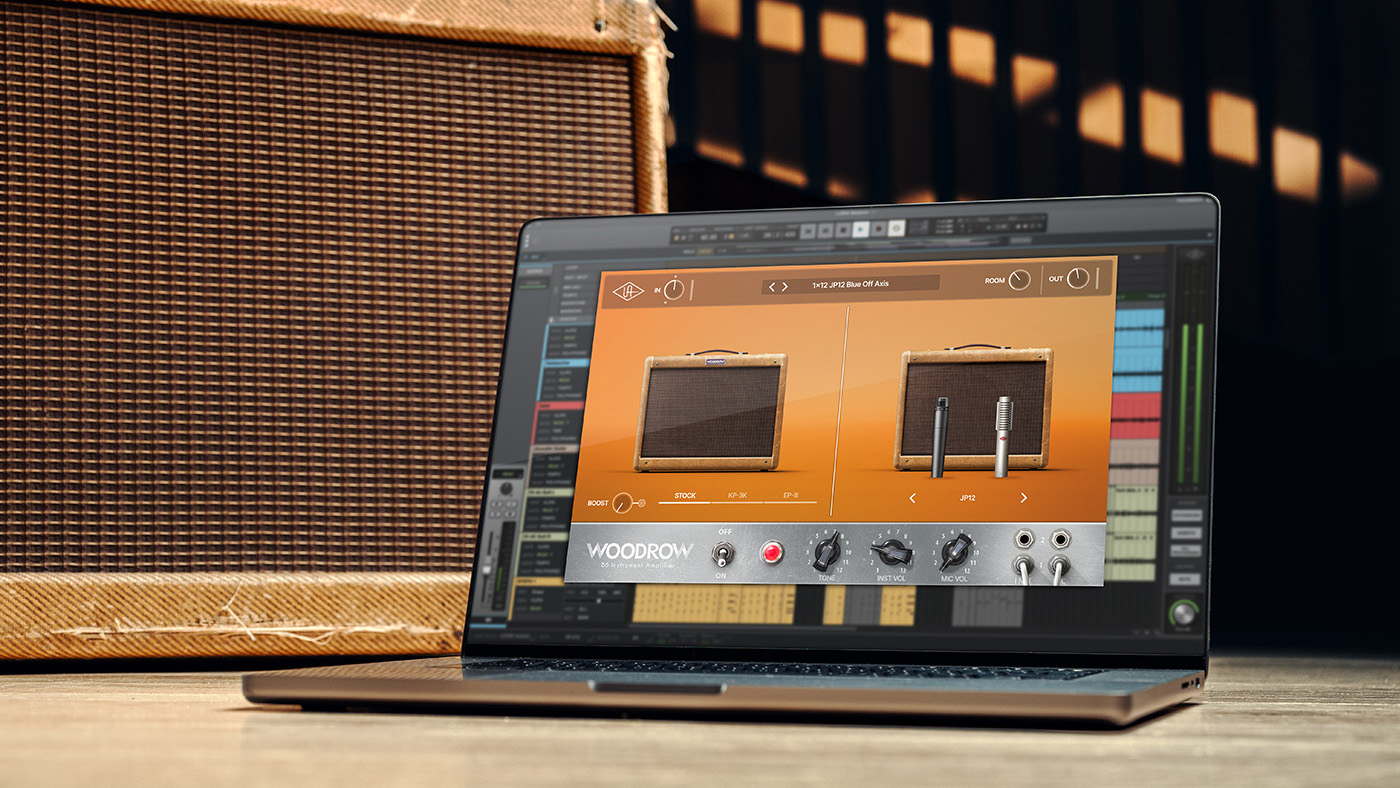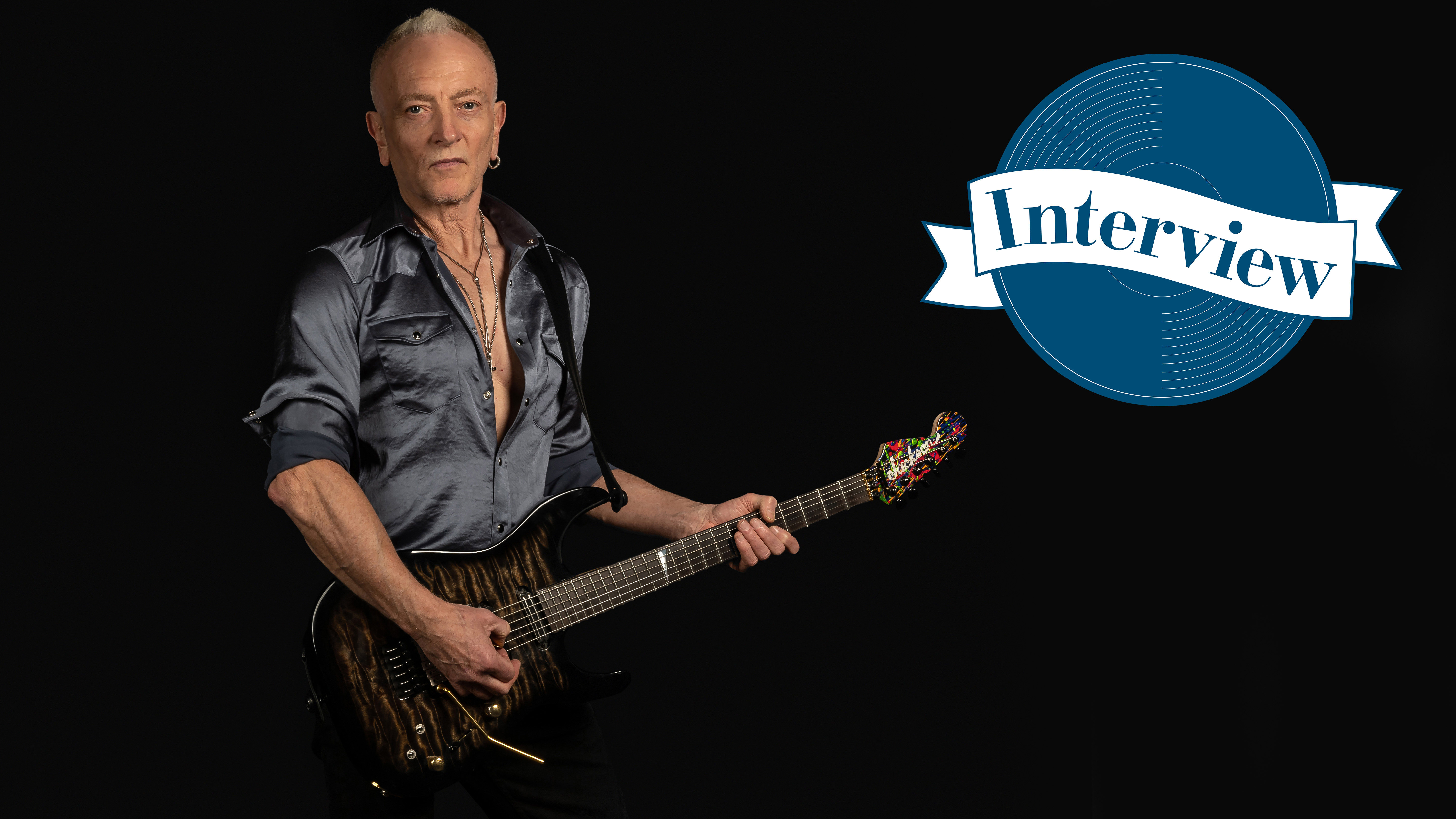
A new album of symphonic reworkings, a new book on their remarkable career and a European stadium tour: Def Leppard are back… and in your face. The Brits are a classic band that have weathered storms and trends with a live reputation and history of anthems that will always see them embraced. They're nice guys too, grounded but not afraid to test themselves, as Drastic Symphonies proves.
Deconstructing their hits and deeper cuts with the London Philharmonic Orchestra, saw singer Joe Elliot duetting with his younger self at times. And while a signature song like Hysteria takes flight with strings in the majestic way you'd expect, the takes on Animal and Pour Some Sugar On Me from the same multi-platinum 1987 album are unexpected, engaging listens.
Leppard's new retrospective history book with Genesis Publications also gives us an excuse to look back with guitarist Phil Collen as we catch up with him remotely at his Californian home. Definitely: The Official Story Of Def Leppard is a real treat for fans and anyone who wants to really understand the Leppard story. The lads from Sheffield who ended up conquering America and overcoming full-scale tragedy, it's a fascinating story that's illustrated with care from Joe Elliot's own archive of memorabilia and candid shots from 46 years as a band.
There's a lot to talk about!
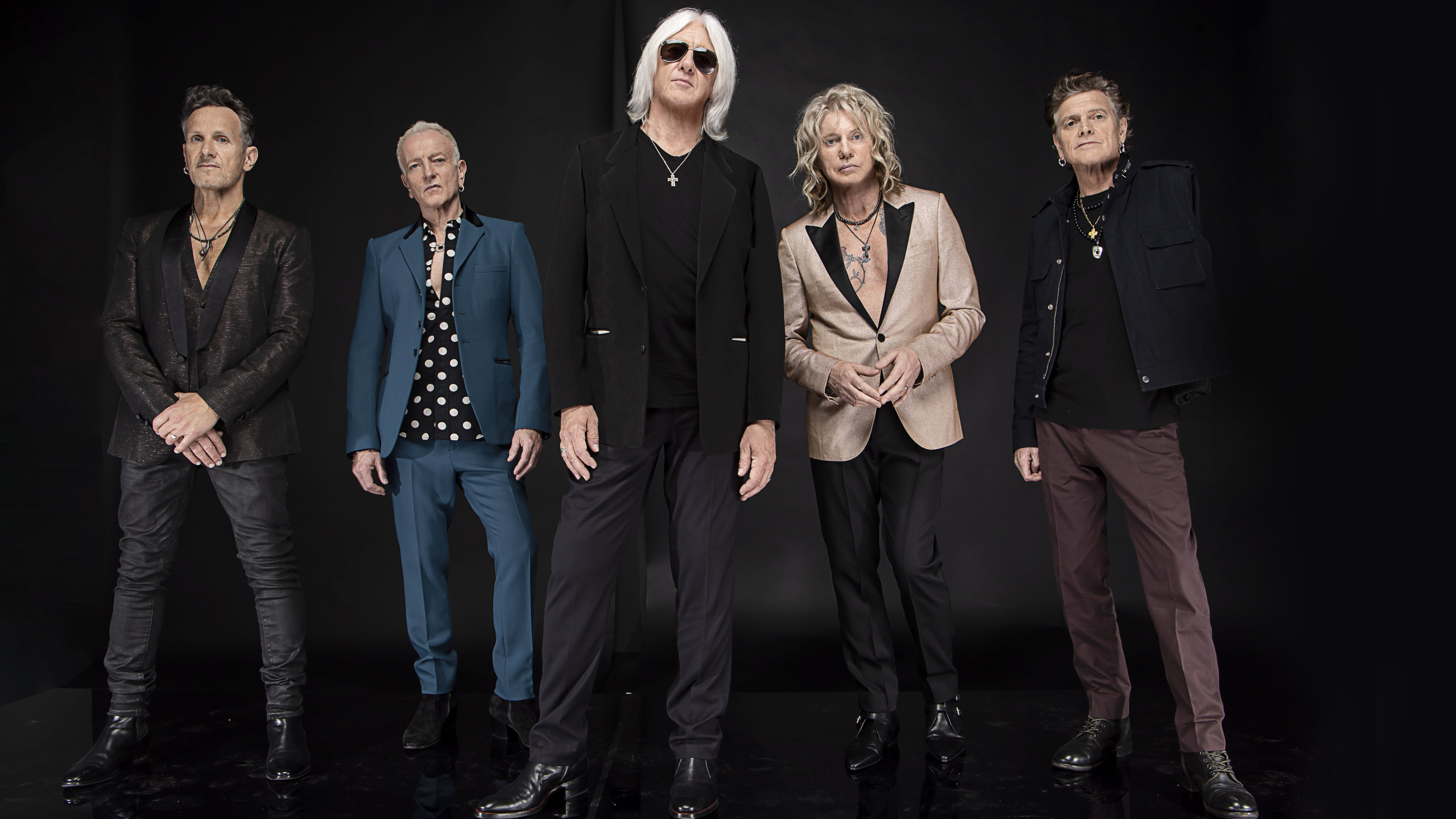
Mutt Lange got us into this vibe and groove of doing things – just trying a bit harder and not just doing it the normal, regular kind of way
Drastic Symphonies is really interesting because you haven't just put orchestral arrangements over your existing songs, and done it the obvious way, you've reworked the songs around the strings – was that kind of deconstruction challenging?
Phil: "It was surprisingly easy. One of the main things was the context of the sounds. We used the parts from the old records on most of it – we re-recorded a few little things. But we didn't want to just do that ordinary average thing that everyone does. We've never really been one for that.
"Mutt Lange got us into this vibe and groove of doing things – just trying a bit harder and not just doing it the normal, regular kind of way. Our motto, and when people ask if we have any tips for [people] starting out is, well your best isn't good enough. So let's start there. So we've always had this kind of thing. With Mutt, it would be using samplers and Fairlights. And then it went on to synclaviers – all this stuff that other bands didn't do, let alone rock bands. So this was part of that thing, really.
Get the MusicRadar Newsletter
Want all the hottest music and gear news, reviews, deals, features and more, direct to your inbox? Sign up here.
"If you just listen to the songs, you go, 'Well, this sound is wrong [for the orchestral version]. So we got our friend, Eric Gorfain, who's an arranger, and this was kind of weird in itself, because he's an American, and we're doing this very British thing at Abbey Road with the London Royal Philharmonic, and all of that stuff. And so this American comes on, he's the guy that we use all the time, but he's part of the band. So it actually wasn't a hurdle. As soon as they heard what he what he wanted to bring to the table it was. 'Oh, ok, that's interesting.' And from there, it was like, 'This doesn't work, let's change the sounds on that'.
"The song Too Late For Love had this part with Joe singing [adopts remarkably accurate Joe Elliot singing impression], 'Somewhere In The Distance' and it was like, woah that's so out of context. And when we stripped the guitars and drums away, and you had this cello playing, he was able to sing it in context. And all of a sudden, you've got that with everything – some of the sounds would have been bombastic [in their original context], and it wouldn't let the strings breathe. So we pretty much did that with every song. And it was it wasn't challenging, it was actually fun.
"It was like kind of this is so obvious of what it's got to be. It's got to breathe here so take the guitar out, take the drums out. Let the solo in Hysteria be strings, which Steve Clark and I were copying in the first place, you know. We did that solo live in this little studio in Dublin. It was us two and Mutt Lange and he said, 'Play it together'. We kind of had this feel of it being strings. So fast forward to now and that's kind of realised – we can actually really do that.
"It's a real album. It wasn't it wasn't just, like you mentioned before, let's put some strings on our other stuff. No, let's be part of it. Let the whole thing breathe and work as an entity."
There are some dramatically different treatments that some people will be surprised by – especially Pour Some Sugar On Me.
"This is the thing with strings and rock bands; you can really make it sound pompous and ridiculous if you have strings copying a riff like [hums Pour Some Sugar On Me riff]. It sounds silly. We can't do that, and obviously the label and everyone's like, 'Well, you've got to do Pour Some Sugar, it's your most popular song'. Rick Savage said, 'Well, what about Em Gryner's version?
"She's this Canadian artist we've known for years, and she was on this TV show and did it on the piano. A beautiful version. And it's like, well let's get her to play the piano as well. And he didn't do it on that but we've got some other stuff. She's a great pianist, and she sings wonderfully. So we just did that version, we just kind of got in touch with her and she duetted with Joe. So it was a totally different way of doing it – it was her style of playing it and we just kind of did it around that."
Other songs get a second chance to shine. Paper Sun is a highlight from the album for me as it's really enhanced by the addition of strings.
"I think that's my favourite one, actually, I'd agree with you. Because it really lends itself it's kind of got the Zeppelin Kashmir vibe about it. When Metallica did the orchestra [record, S&M] as well, it's got real power. Like they did – they had some powerful movements like the Zeppelin stuff. That song, for us, is kind of like that. It's one of our epic songs and it's got these sections, and has these killer solos and everything else. So it really lent itself to be given that kind of treatment, I think."
The vocal dynamics in Def Leppard are equally as important as the guitars, and this record is showcasing them in a different way too.
"I think so. We use backing vocals as an instrument and when you put it with strings, just sonically, it just sounds beautiful. When you hear a choir in an orchestra as well, it kind of has that thing. We've got our own choir – we're Def Leppard, so it's it really works in that context as well. We were just blown away with that."
"Ronan McHugh [co-producer and mixer], he needs some props here because he did all of that. He would remix everything to make it work sonically. Whenever you're recording, there's a thing with rock guitars and cymbals that goes through the top [end] and Ronan is a genius at doing all of that stuff. It was amazing to have him do his thing through this orchestral context."
What was it like for Joe duetting with his younger self on some of the songs?
"He mentioned that it kind of freaked him out a little bit when he got to do that. Again, it's context; it's like you on some of the parts of that song we were talking about, Too Late [For Love], where he harmonises with himself, and me actually – I'm singing the harmony on that part as well. It's kind of weird, like a ghost or something, but really cool.
"The whole thing was a wonderful experience, especially as we approached it that way. The really great thing is the team, like Nick [Patrick] who [co] produces the thing, and [string arranger] Eric Gorfain, Ronan and us, there was no butting heads at all anywhere. And then you've obviously got the strings and the conductor that you've got to get this past. You don't want it to be like they're hating every minute of it. So when we were in the final part in Abbey Road Studios, it was a joy to watch the orchestra and the conductor really enjoy the dialogue with Nick the producer, Ronan our producer and the whole thing. It was kind of magical to be quite honest, and that rarely happens."
There's 16 guitar parts on some of the stuff on Hysteria. But never gratuitous
Guitarists can have this instinct to fill songs with as much guitar as possible sometimes, but it sounds like you were very open to taking guitars out.
"Absolutely yes, the song is king and the entity that is Def Leppard is king, so when you go in there's no place for that ego thing. We've always had that to be quite honest, Mutt Lange just kind of ironed that out of us straight off the bat. He'd go, 'Well, that sounds crap'.
"You're kind of taking away from the song if you play the wrong guitar solo. I've heard so many solos that can f*** a song up, you know, just by inserting too much of someone's personality as opposed to listening to the song. And so with this it was again, this sounds so much better if you just hijack the guitar, leave it for something else and have it come in later on – if it needs it."
Conversely, were there any songs where you got to do to try out a guitar idea that you never got to try out? In the first, the first time you recorded them?
"Not really. I mean, this is Def Leppard after all, so we pretty much exhausted some of these things [first time around] – there's 16 guitar parts on some of the stuff on Hysteria. But never gratuitous, it was about trying these things out.
"There's this wonderful bit on Armageddon It. I remember doing it and I was with Mutt in the studio, and he said, 'Right, let's do this Tubular Bells thing but do it with guitar harmonics'. So we had to tune the guitar and tune each string so we could get these harmonics and go, 'Ding, ding, ding, ding'. And it was just an ear candy. I completely forgot about it and then years later when we doing the residency, I'm listening to the thing on headphones and thinking, I can hear these harmonics in the distance. And it was like, 'Oh, yes!' So things like that, it was never gratuitous, it was to add to the excitement and the entity."
The new Def Leppard book is really interesting – even for someone who is familiar with the band there's a lot to be discovered in there. It feels like Joe has been quite a good historian for the band over the years and that's showcased in the pictures.
"He is, he's also an avid collector – like, he'll have a ticket, so he's that guy and thank God, you know. There's this great story. I don't know how he gets this stuff but he had a version of all the young dudes with Mick Ronson and David Bowie doing it with Mott The Hoople. He met Bowie one time, and he's going, 'Did you know, I've got a version of you singing the thing with Mick on guitar and with Ian 'Hunter] and the band. Bowie said, 'What?! Really?' So he went home and got it for him and gave Bowie this thing. So Joe is the collector and he documents stuff – t-shirts, laminates and just stuff.
"He's very organised as well – all the CDs are alphabetically organised, and the numbers all tally. So if you ever want to find anything out he's definitely the guy."
It's easy to forget just how successful Def Leppard have been in the US. You were the biggest rock band there since Deep Purple and Zeppelin. But it's fair to say the UK never really got you in the same way.
"Oh, absolutely. Something dawned on me a few years ago, we sing with American accents. And that's because we learned from Mick Jagger – he would always sing with an American accent, and it wasn't put on – it wasn't like a thing. That's where he learned to sing it. He learned from Muddy Waters, Chuck Berry, Little Richard, James Brown – that's how he learned to sing. So then we would learn it from them, Zeppelin… everyone would sing with American accents because they're copying American artform, if you like.
"So I think that may have something to do with it. And Mutt Lange was a student of American music. I definitely met people in America for years and they didn't know we were English. They thought we were American and sounded American. It may have something to do with that. But I think it was just it just lent itself to an American kind of style."
At the same time, you've always seemed grounded as a band in a typically British way. You're all in touch with your roots.
"Totally. I was born in Hackney and grew up in Walthamstow and Leyton. I still sound like it, even though I've lived in California for 33 years. It's that very working-class thing that always drives us forward actually, it's something we have we have in common.
"And I think I may have mentioned it in the book, but everyone asks, 'How come you guys are still around?' And I say, well, we got this value system from our parents. I World War Two they'd have to go in the air raid shelters, Nazis were blowing the cities up. And so you had this very working class thing – like taking a shower. I remember when I was a kid, you would only you'd wash during the week with a hand towel. But you'd only have a bath once a week, which was kind of weird. And you tell Americans and Australians that and they say, 'Eugh! What's wrong with you?' And it was just the thing that we got from our parents.
"There's an appreciation or something that we still have that's very, very working class. I mean Joe, and all the boys, same deal with their parents up north. So that definitely grounds us and keeps us very English and very working class, I guess."
It's interesting in the book reading about how you joined the band during the recording of Pyromania, because you weren't actually told it was an audition and thought you were just helping out your friends with some solos.
"I honestly thought, 'Yeah, this stuff sounds amazing'. They'd done all the backing tracks, the vocals and it was genius. Then Mutt said, 'What would you do over that?'" [the song in question was Stagefright].
"For me it was like, wow, this is heaven, you know? And then we went on tour and here we are 41 years later."
That album also has the song Photograph on. And you mention in the book that you believe that song really opened the door for the band in the States.
"Absolutely, I mean, it was a hybrid – it was a rock hybrid. It was so melodic but the backing vocals and the vibe of it was still a rock band, it was still a British rock band. There is a difference – I remember hearing like Journey, Styx, REO [Speedwagon], and their vocals are wonderful, but they were very sweet and sounded very American. But there's another part to British music and it's the Sex Pistols and it's like that [adopts Johnny Rotten voice], 'No future!' It's just got this kind of vibe that that we still had [as] part of our vibe, if you like, even going into America.
"So we retained some of the British, I don't wanna say punk ethos, because it's not really that, but it was it there was a hard rock thing that was definitely British, and it was retained. And Mutt Lange – genius, he was able to, to make this hybrid work. And it's got these beautiful melodies with a rock band, an AC/DC-style rock band, doing all this stuff, with a bit of Queen in there, but unmistakably Def Leppard.
"And then when I played that solo, it was a bit of a shred solo but it was very melodic, and I double-tracked it, so [I] couldn't go too far off the path with it. Also, MTV was exploding as well and we didn't look like other rock bands. It was like Duran Duran-ish, almost because we were really young. And it had all these elements at the same time. So that song and that video definitely did the trick."
The shows kept getting bigger for the band, and obviously your rigs followed suit because they had to recreate the tones of Pyromania and Hysteria. Is there any guitar gear from back then you miss but wouldn't work in your rig these days?
"None of it would work now. I use a Fractal [Axe-FX] that's like you can do anything on that. And they even do a foot pedal version. I've got these little Atomic [Amps] powered speakers, and I just have two of them. We can do stadiums with it, which I have done. I played with Chaka Khan, where I was a guitar player for this one thing I did and I used them for that and it just sounded amazing.
"So I think there's a huge difference between the gear – the technology is now at the point where you're like, wow. But occasionally I plug into a Marshall or something and it's great for five or 10 minutes, then it's too heavy. I've got this Blackstar combo that I have at home that I play and that sounds great. But at the end of the day, when you're travelling, you're shipping stuff and everything, the Fractal itself is so much easier.
"The other thing that was definitely a sound was the Rockman [amp]. We used that on Hysteria. So again, it's the same deal; you miss that, and it's great. It's great when you plug in for a minute because it brings back all these memories, but the reality of where guitar playing and where the technology has gone is so far advanced now that I think it'd be hard to go back. I mean it'd be great playing in a bar or something with a Marshall or doing something in a studio with a Rockman but the reality now is what I've been dreaming about for years to be quite honest."
Was the Rockman something you used as layering with other guitar tones on Hysteria, rather than something that worked best in isolation?
"It really was. When you track vocals, they're sonically fighting for for the same frequency. With a Rockman you can layer it, and then you can have this sub-bass, the kick drum and this massive snare, and the vocals have their own place. Mutt was very aware of that and the Rockman was absolutely perfect for that.
"It wasn't the biggest rock sound and when you heard it on its own it kind of sounded a little and kind of weird unless you were playing the clean parts. But you track it up with all these other instruments and it sounds monstrous."
Elsewhere in the book you talk about not suffering from stagefright, and that you have an avatar that goes onstage – kind of a stage persona. Was that always the case?
"I thought so but it really kicked in later. We played some shows with Montrose. Me and Ronnie Montrose were talking about Jimi Hendrix, and I said, 'You know what, I've started just closing my eyes [when I play]. Hendrix always closed his eyes'. And Ronnie Montrose said, 'I do that as well sometimes and I noticed the difference'. And I think something started developing around that. This was in the '90s, and a different swagger came about from not getting too involved in all these people out there and the drums over there in this stadium, arena or whatever. You didn't do that – you'd just get involved and get lost in the music. And that sounds really corny and everything, but you would actually get lost in it. It gave a different perspective.
"Then the swagger got more about confidence and all of these other things. And it really just from appreciating Jimi Hendrix a bit more. And you kind of created this other character, but I think that's where that's come from. Now I don't even have to worry about stage fright so that's pretty cool."
Was it strange to adapt when Def Leppard started playing shows in the round on the Hysteria tour in 1987 and 1988?
"It took just one show, I think. I remember it was played Glens Falls, New York, and Tesla were the opening act. So they were kind of like sacrificial lambs! Then we went on and when it kind of adjusted itself and you realised it was a completely different thing, it was way more enjoyable.
"You had four front rows. There was music everywhere, and you would find your space. Now we have in-ear monitors and it would be great to do that now. But back then it was it was slightly scary at first but when you got your foot in it was so enjoyable. It was actually more fun than any stage to be quite honest. And it was just a joy to do it.
"When we had to play at one end [of the venue] it felt like we were being cheated out of something. But it was exhausting. I remember coming offstage from those shows on the Hysteria tour, and we'd do two and a half hours. And you'd be exhausted, dripping with sweat, but I loved it. I would love to do that again, at some point."
There's a lot of challenges facing live music now, and the whole Ticketmaster thing too, but you guys have continued to be a huge live draw. You were one of the first bands to develop the idea of the classic rock package tour in the modern age, and that's developed with The Stadium Tour. What's the key to keeping that consistency?
We learned something when we went out with Kiss; the show is more important than anything
"Rolling with the punches and moving with the times. It's like everything, I remember when it went from vinyl to cassette, and then CD, then then it's download, then it's streaming… you couldn't have imagined that stuff. But you have to go with it, you have to roll with it. And the shows are the same. This Motley tour is amazing. We were just in South America, and people are crying, people are just in tears, they're going, 'Oh, my God!' They get to see these two juggernaut rock bands that they never thought they would actually see again.
"We keep raising the bar with our vocals and playing, and the way that we present the show. And I think you have to do that. Motley is very different to us, but it's the same thing in that it's a massive show, and it's really exciting.
"We learned something when we went out with Kiss; the show is more important than anything, and you take the ego out and the crews work together and everything is the show. Beyonce just did a thing a few months ago in Dubai and it was so over the top. And that's what you're competing with – pop things, and you've got to be this massive rock band. So you keep having to raise the bar, and you keep having to get better. And I think that's the difference. That's value for money for a start-off. The minute you go out there and you're not really into doing it, you're turning your back on the audience, you're not really putting everything in, is the moment you kind of lose that. So I think there's a constant thing of striving to be better, and especially with the show."
In many ways it's hard for new rock bands coming in now because the industry has changed so much, but it feels like there's still this fundamental truth; songs and the ability to perform them well still matters.
"A hundred percent. It's integrity. And that's what's kept us here, it's the band's integrity. It would be so easy to p••• and moan about something, when you're playing anywhere live – you're playing in front of people. You dreamt of this thing. So we get we still get the opportunity to do that and I think it's the integrity.
"What would I do if I was starting out now? I would play the opening of a letter. There was one thing I remember about Ed Sheeran when he came out, and I was very impressed with what he did. I saw him talking about looping his acoustic guitar and he's playing at Camden lock, and the same day he'd be doing an open mic somewhere. Then he'd be down the subway playing acoustic guitar. That's what you've got to do, and if you can't do that then you ain't got a chance.
"With Ed Sheeran, power to him because he soldiered through that and he became this great songwriter – this amazing artist. So whether you like him or not, that's the role model because that's what you have to do. I remember again, Arctic Monkeys, when they came out. They were like the biggest band in the little part of Yorkshire because they would play this one gig every week. And then they'd play this other one, then they got this network going and they'd play their asses off everywhere they could and before you know it, everyone started believing in that. So that's what you've got to do. There's so many people that are lazy and some aren't even lazy, they just don't know that it takes so much hard work and even then you may fail. So what are you prepared to sacrifice? And that's really it."
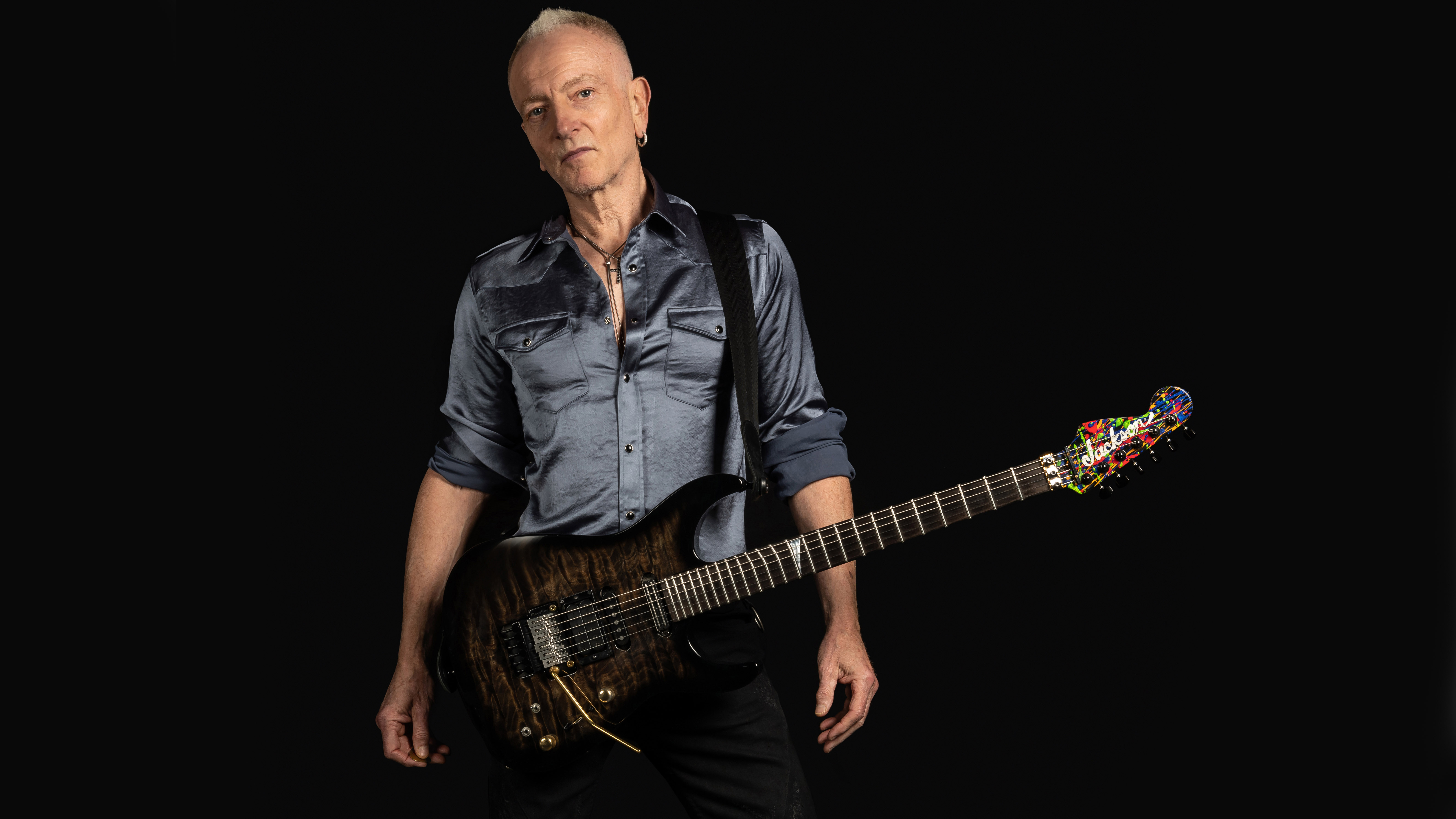
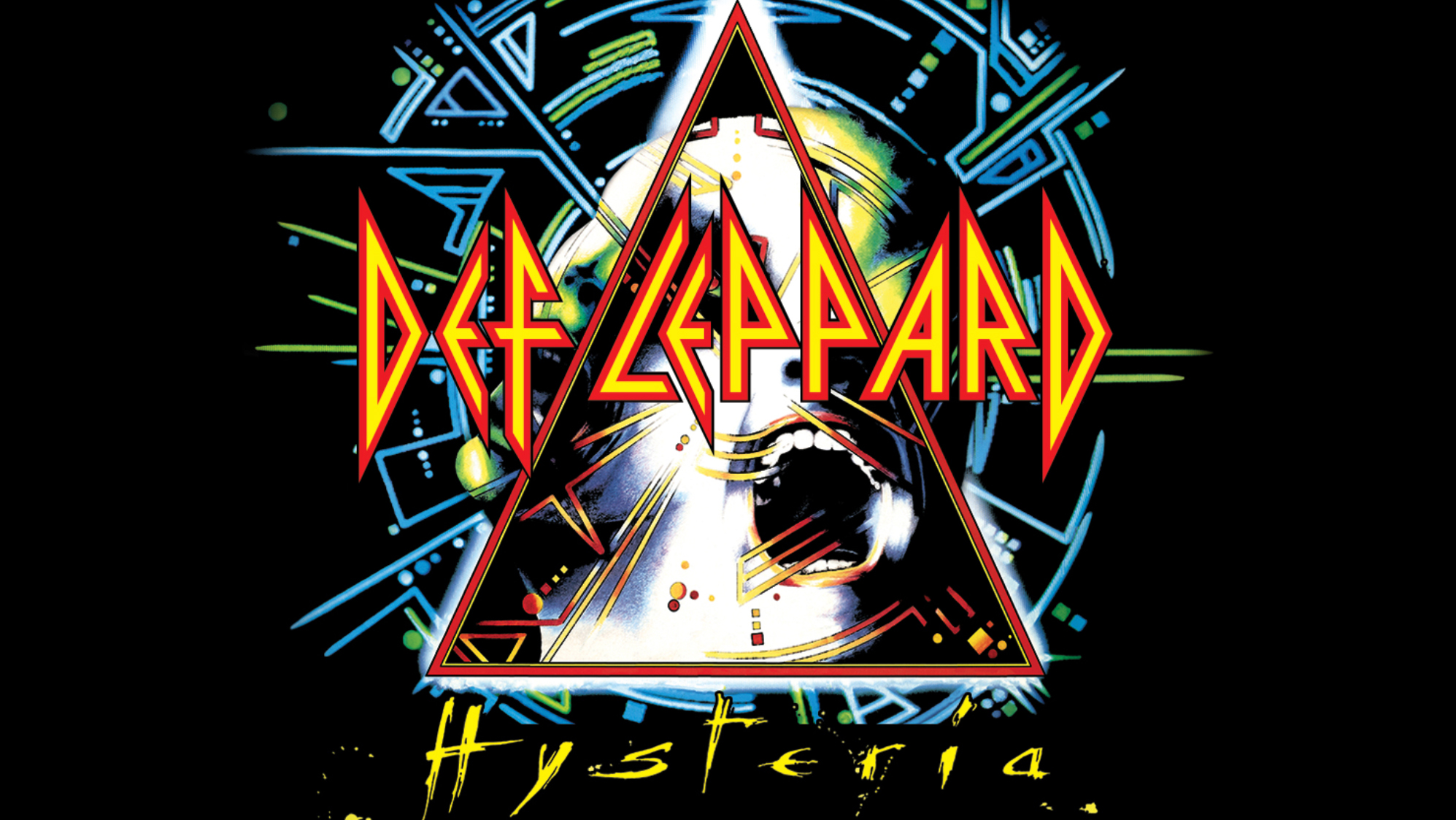
"It was the best thing I’d ever heard" – Phil Collen talks Def Leppard's Hysteria track-by-track
This is a slightly random question but when we visited the US Fender Factory in California we were sat in a large room with a stage that was lined with pictures of you. Then we realised it was actually called the Phil Collen room. How did that come about?
"So I'm so blessed and honoured actually because at there's Fender there are three rooms [named after guitarists]. They've got an Eric Clapton room, which is like a conference room. There's the Jeff Beck room and there's the Phil Collin room, which has a stage and everything. I actually played there once and we opened it up.
"Steph, who works at Fender, went out of his way and did that. Because I'm always going down, and Jackson is owned by Fender. And I go down, I say hi to all the people in the factory and sometimes just play for them and all of that stuff. I've been with Jackson for 36… 30-something years, and I always go down there. They honoured me with this wonderful room, and it has a soundstage as well. It's great."
And on that note, is there anything new in your rig when it comes to Jacksons?
"On this tour, I've upgraded with DiMarzio X2N pickups – their most powerful pickups. I'm changing things out on my PC1s. So we've got some of the older guitars and upgraded them; put titanium in with the Floyds. And they sound great and most of them [now] have a similar style neck. I've got really fat necks on my later guitars. Some of them are kind of vintage, they're vintage Jacksons and really played-in. They're old guitars but updated and upgraded for this tour."
- Drastic Symphonies and Definitely: The Official Story Of Def Leppard are out now. Def Leppard and Mötley Crüe tour Europe in May, June and July before August dates in the US. More info at defleppard.com

Rob is the Reviews Editor for GuitarWorld.com and MusicRadar guitars, so spends most of his waking hours (and beyond) thinking about and trying the latest gear while making sure our reviews team is giving you thorough and honest tests of it. He's worked for guitar mags and sites as a writer and editor for nearly 20 years but still winces at the thought of restringing anything with a Floyd Rose.
“For some reason, the post office shipped your guitar to Jim Root of Slipknot”: Sweetwater mailed a metal fan's Jackson guitar to a metal legend
"No one phoned me. They never contacted me and I thought, 'Well, I'm not going to bother contacting them either'": Ex-Judas Priest drummer Les Binks has died aged 73

